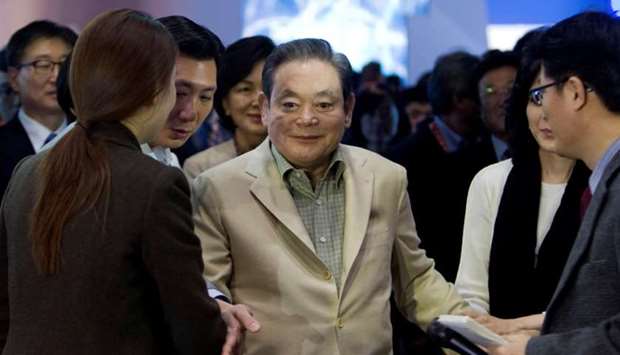South Korea's richest and most powerful industrialist, Lee Kun-hee, turned Samsung Electronics into one of the world's biggest tech companies but lived a reclusive existence.
Still, occasional pronouncements on business by the tycoon, who died at 78 on Sunday, reverberated through the country.When he inherited the chairmanship of the Samsung group in 1987 -- founded by his father as a fish and fruit exporter -- it was already the country's largest conglomerate, with operations ranging from consumer electronics to construction.
But Lee transformed it into a global power -- by the time he was left bedridden by a heart attack in 2014, it was the world's biggest maker of smartphones and memory chips.
He seldom ventured out from the high walls of his private compound in central Seoul to visit the company headquarters, earning him the nickname "hermit king".
Samsung is by far the biggest of the chaebols, the family-controlled conglomerates that dominate South Korea's economy.
They drove the nation's transformation from a war-ravaged ruin to the world's 12th-largest economy, but nowadays are accused of murky political ties and stifling competition -- with Lee himself twice convicted of criminal offences, in one case bribing a president.
Lee's far-sighted leadership style was widely credited with turning Samsung Electronics, now the group's flagship subsidiary, into one of the world's leading developers and producers of semiconductors, mobile phones and LCDs.
"Chairman Lee was a true visionary who transformed Samsung into the world-leading innovator and industrial powerhouse," Samsung said in a statement announcing his death.
"His legacy will be everlasting."
Early in Lee's chairmanship, Samsung was seen as a shoddy producer of cheap, low-quality products.
"Let's change everything except our wives and kids," he said in 1993.
The company gathered up and burnt all 150,000 mobile phones it had in stock, paving the way for the rebirth of the highly successful "Anycall" handset.
Soon afterwards, he ordered Chinese-made products to be displayed at Samsung headquarters, saying it was important to show how China was quickly catching up.
Lee rarely spoke to the media, but was closely watched whenever he broke his long silences, often with doom-laden New Year corporate addresses.
In meetings with subordinates and occasional interviews, Lee always stressed the importance of bright minds in business.
"No matter what happens, there will be nothing to be afraid of if we have the best talent," he once said.
"In the era of unlimited competition, winning or losing will depend upon a small number of geniuses... One genius will feed 100,000 people."
Lee, the third son of Samsung group founder Lee Byung-chull, had a soft spot for dogs -- developed as a child in Japan where he went to school from age 11.
"My first love was my Pekingese," Lee wrote in a collection of essays published in 1997. "I learned then that an emotional dialogue between a man and a dog was possible."
He was also known for his love of movies, horseriding and exotic supercars.
Lee studied at Japan's prestigious Waseda University and earned an MBA at George Washington University in the United States.
At the age of 36, he became vice chairman of the group's construction and trading arm, and became group chairman nine years later, shortly after his father's death.
Lee was known for taking months-long trips to Hawaii and Japan before key business decisions, including the promotion of his own son Lee Jae-yong to vice chairman of Samsung Electronics in 2013.
Big business and political power have often been closely linked in South Korea, and in 1996, Lee Kun-hee was convicted of bribing former president Roh Tae-woo.
While Roh was in office, Lee paid him "a large sum of money in bribes over a long period", the court ruled, seeking favours for Samsung in the president's business policy decisions.
Lee was also found guilty of embezzlement and tax evasion in a slush fund scandal in 2008, which saw him briefly step down from the company leadership.
But suspended sentences meant he never served time in jail and he received two presidential pardons, going on to spearhead his country's successful efforts to secure the 2018 Winter Olympics.
A few years later, he fought off a lawsuit from his older brother and sister claiming they were entitled to Samsung shares worth billions of dollars.
Lee married Hong Ra-hee -- whose father was a justice minister -- with whom he had a son and three daughters.
After his heart attack, Lee spent his last years in medical care.
Secretly filmed footage broadcast in 2017 showed him seated in a wheelchair, while other reports said he was in a coma but did not need a ventilator.
Little was ever revealed about his condition, leaving him shrouded in mystery even in his final days.

